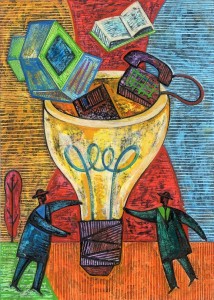Digital history across the conference
09 April 2012 – Cathy Stanton
 A couple or three years ago, I recall hearing someone say in a meeting of the NCPH Digital Media Group that before long, we might find that “digital history” wasn’t really a separate realm anymore, but simply integrated into most aspects of what we do as public historians. Looking at this year’s conference schedule, I think we’re definitely getting closer to that moment of integration. The digital is showing up in scholarly panels (for example, as part of a panel on “Frontiers of Trust: Confidence Building in American Business and Technology” on Thursday at 1:30 p.m., or my own “Museums and Makers: Intersections of Public History and Technology Buffs from Steam Trains to Steampunk” on Thursday morning at 10:30 a.m.) as well as in workshops (one on online primary sources and one on large-scale digitization, on Saturday at 10 a.m. and 1:30 p.m. respectively) and a Working Group on “Public History Online” on Saturday at 1 p.m.
A couple or three years ago, I recall hearing someone say in a meeting of the NCPH Digital Media Group that before long, we might find that “digital history” wasn’t really a separate realm anymore, but simply integrated into most aspects of what we do as public historians. Looking at this year’s conference schedule, I think we’re definitely getting closer to that moment of integration. The digital is showing up in scholarly panels (for example, as part of a panel on “Frontiers of Trust: Confidence Building in American Business and Technology” on Thursday at 1:30 p.m., or my own “Museums and Makers: Intersections of Public History and Technology Buffs from Steam Trains to Steampunk” on Thursday morning at 10:30 a.m.) as well as in workshops (one on online primary sources and one on large-scale digitization, on Saturday at 10 a.m. and 1:30 p.m. respectively) and a Working Group on “Public History Online” on Saturday at 1 p.m.
Somewhere between the scholarly and the pragmatic, Benjamin Filene will lead a session called “Letting Go? Historical Authority in a User-Generated World,” along with two practitioners from the Philadelphia art and museum world. This looks like it will be a smart and provocative session–it’s at 8:30 a.m. on Saturday, for those who aren’t planning to attend the NCPH awards breakfast in that same time slot (the frustrations of the packed conference program!).
 For those who want to roll up their sleeves and work on a project (or at least brainstorm about one), THATCamp NCPH will take place all day Wednesday at a cost of just $30. Facilitated by staff from the Roy Rozenzweig Center for History and New Media, it’s part of a booming worldwide “unconference” movement in the digital humanities that lets participants craft their own working groups and share questions and expertise. Registration is still open for THATCamp – visit the website for more information.
For those who want to roll up their sleeves and work on a project (or at least brainstorm about one), THATCamp NCPH will take place all day Wednesday at a cost of just $30. Facilitated by staff from the Roy Rozenzweig Center for History and New Media, it’s part of a booming worldwide “unconference” movement in the digital humanities that lets participants craft their own working groups and share questions and expertise. Registration is still open for THATCamp – visit the website for more information.
And two other digital happenings to be aware of in Milwaukee are the Digital Drop-In session on Thursday from 1:30-4 p.m. and the brown bag lunchtime Lightning Talks session on Friday from noon to 1 p.m. At the former, you can pick the brains of knowledgeable and friendly techies who will offer targeted advice on specific questions arising from digital humanities projects; at the latter, you’ll have two whole minutes in the spotlight to tell the world about one of those projects. The Drop-In is free–just come prepared with a focused question that you’d like help with. People are asked to sign up in advance for the Lightning Talks, which you can do at the registration table on Friday morning. (If you plan to show off your online site itself, plan on using Web-based presentation materials only, rather than bringing a USB drive or laptop. Hard copies of handouts are welcome!)
There are other digital-related sessions listed in the conference program (PDF)–make sure to check out the New Media list on p. 39 and the Highlights on pp. 16-17!
~ Cathy Stanton




I’m excited by the depth and breadth of the digital history opportunities at this year’s conference, but am faced with a technological dilemma. Which is the optimal device for taking full advantage of all of those opportunities: a laptop or an iPad?
Funny you should ask that – I was just discussing that question with someone else from the NCPH Digital Media Group! She said she’s stopped lugging her laptop to conferences, in part because the wifi in hotels is not always as reliable as one might hope, so she just uses her smart phone. I continue to lug my laptop, while I have colleagues who have gone iPad-only in the past couple of years. So I guess the answer is…whichever you’re happiest using!